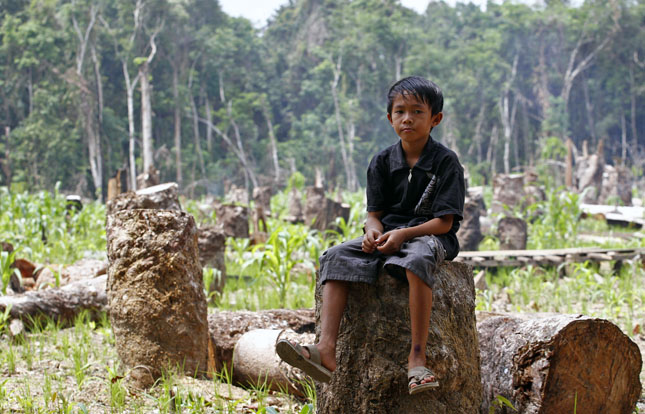-
Who Benefits From REDD+? Lessons From India, Tanzania, and Mexico
August 4, 2015 By Prakash Kashwan
REDD+, a global framework designed to reward governments for preserving forests, has pledged nearly $10 billion to developing countries. But minorities, indigenous people, the poor, and other marginalized groups that live in forest areas often end up paying more than their fair share of the costs of environmental cleanup and conservation while getting less in return. What can be done to change this?
In an article published this month in Global Environmental Politics, I show that international interventions are likely to favor forest-dependent people only when government agencies work under stringent political oversight in the form of inter-agency checks and balances. Forest administrations that enjoy wide-ranging powers with limited checks and balances tend to share fewer benefits with forest-dependent people.
Why is this important? Beyond the ethical argument for rewarding those who bear the biggest burden, when local people do not benefit, forest conservation efforts tend to be unsustainable.
The intention is not to suggest that other factors are any less important. Indeed, as other scholars have shown, the nature of forest policy and clarity of forest property rights are also important. But while necessary, strong policies and property rights systems are insufficient to bring about progressive outcomes. More equitable disbursement of REDD+ funds and sustainable forest conservation efforts depend on the political processes that are charged with implementing policies and programs.
Lost in Translation
These arguments are based on a comparative analysis of India, Tanzania, and Mexico. All three countries have large forest areas that are home to predominantly poor, forest-dependent groups. Each has enacted policies that decentralize important forest management functions to groups of forest-dependent people. And, most importantly, each has more than one set of laws and policies related to forest rights with important implications for the distribution of costs and benefits of forest conservation.
When local people do not benefit, forest conservation tends to be unsustainableSome forest and land tenure laws, such as India’s Forest Rights Act, Tanzania’s Village Land Act, and Mexico’s Agrarian Laws, give forest-dependent groups much stronger rights and authority in the management of land and forests than national forestry laws. With overlapping laws on the books, policymakers are often in a position to make choices about which will govern the distribution of benefits from forest conservation. The choices that REDD+ policymakers make tell us about the extent to which they are committed to the goals of sharing with forest people the fruits of forest conservation. Mexico’s REDD+ policy builds on the provisions of one such law – the Agrarian Law of 1992 – to assert unambiguously that the members of agrarian communities own “carbon rights,” but such is not the case in Tanzania and India.
Such a comparative analysis is challenging because policymakers are adept at deploying different elements of policy design to equivocate and to create policy ambiguities, which allow them to exercise discretion and control the eventual flow of benefits. REDD+ policy proposals in India and Tanzania are full of lofty statements about respecting the livelihood needs and tenure rights of forest-dependent people.
Officials in India’s Ministry of Environment and Forests have claimed that “100 percent of the funding from REDD+ will flow to local communities.” But in implementation policymakers routinely rely on laws that vest significant powers and resources directly under the control of government forestry agencies rather than local people. There is no mechanism that ensures transparent and timely flows of funds to communities. REDD+ benefit-sharing proposals are instead linked to the Joint Forest Management program which during the 25 years of its existence has done very little in terms of devolving genuine authority to forest-dependent groups.
Similarly, in Tanzania, the REDD+ strategy document describes community-based forest management as the “most appropriate way to achieve forest landscape restoration.” However, government forestry agencies have imposed a long-winded process of bureaucratic approvals needed before a village can participate. The REDD+ policy proposals of these two countries are thus marred by double standards.
Deeper Democracy
It is important to understand why Mexico has committed credibly and unequivocally to share REDD+ benefits with its agrarian communities, while Tanzania and India have not. A careful analysis of the policy processes in these countries shows that the REDD+ policy outputs reflect fundamental differences in the institutional structures that govern the functioning of national forestry agencies and ministries.
India, ostensibly the strongest democracy, has miles to goEven though Mexico is considered to be a relatively weaker democracy, its long history of social and political mobilization has ensured that peasant federations and representatives of forest people have a direct say in the policy process. Tanzania, which also has relatively weak democratic institutions, has worked with donor agencies to bring about structural reforms in the forestry sector. These reforms have focused on creating inter-agency checks and balances, such that the agency responsible for monitoring and auditing forest policies and programs is separate from the agency responsible for executing them. Such reforms are likely to improve the accountability of forestry administration.
India, ostensibly the strongest democracy, has miles to go before such a separation of executive and monitoring functions is achieved. The country has a rather monolithic forestry administration anchored by members of the elite Indian Forest Service, who lead all important units related to forest policy and programs.
This research shows that while it is important to build the capacity of national forestry administrations, such efforts may prove counterproductive without structural reforms to ensure national forestry agencies are also accountable to citizens, especially those most directly reliant on forest resources. This is no less true in countries that have strong democratic institutions in other respects.
Improving the accountability of national forestry agencies will go a long way to ensuring the benefits of REDD+ and other forest protection schemes are shared widely. As the success of Mexico’s community forestry program shows, a broad-based sharing of the benefits of forest conservation is critical for fostering and sustaining collective conservation efforts.
Prakash Kashwan is an assistant professor of comparative environmental policy and politics at the University of Connecticut, Storrs.
Sources: Center for Global Development, Environmental Science and Policy, Global Environmental Politics, Lele and Menon (2014), Sustainability Science.
Photo Credit: A boy in Kalimantan, Indonesia, courtesy of Achmad Ibrahim/Center for International Forestry Research.
Topics: Africa, biodiversity, community-based, conservation, demography, development, economics, environment, featured, forests, funding, Guest Contributor, India, international environmental governance, Latin America, livelihoods, Mexico, mitigation, natural resources, poverty, protected areas, REDD, South Asia, Tanzania
 A Publication of the Stimson Center.
A Publication of the Stimson Center.






